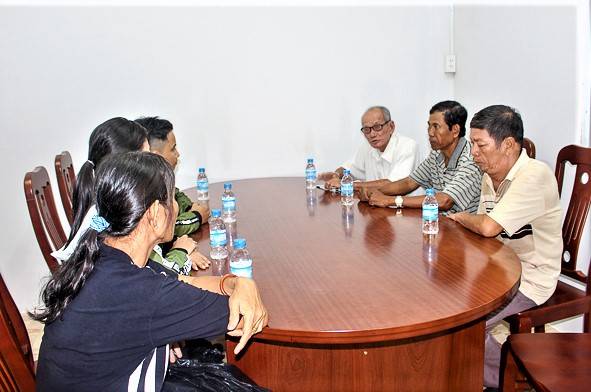Modes of mediation or dialogue at courts in Vietnam
What are the modes of mediation or dialogue at courts in Vietnam? - My An (Tien Giang)

Modes of mediation or dialogue at courts in Vietnam (Internet image)
Regarding this issue, LawNet would like to answer as follows:
1. Modes of mediation or dialogue at courts in Vietnam
Modes of mediation or dialogue at courts according to Article 22 of the Law on mediation or dialogue at the Court 2020 are as follows:
- Mediation or dialogue may be conducted in one or more sessions.
- Mediation or dialogue may be conducted at or outside the head office of the court at the parties' discretion.
- Sessions of mediation or dialogue may be conducted in the form of direct or other appropriate forms at the request of the parties.
- Mediators may conduct mediation or dialogue in presence of the parties or meet them separately; request each party to present their opinions on issues of the civil case or administrative lawsuit; propose solutions for mediation or dialogue.
In case one of the parties has a representative and/or an interpreter, the mediator must invite them to participate in mediation or dialogue.
2. Procedures for mediation or dialogue sessions at court in Vietnam
Procedures for mediation or dialogue sessions at court according to Article 26 of the Law on mediation or dialogue at the Court 2020 is as follows:
- The mediator introduces participants in the mediation session; present the content that needs mediation or dialogue; the process of preparation for mediation or dialogue; read the provisions of law related to the resolution of civil case or administrative lawsuit, analyze legal consequences of successful mediation or dialogue.
- The petitioner, or his/her representative, presents the contents of the petition; proposes his/her points of view on issues that need mediation, dialogue and directions for settling the dispute or lawsuit.
- The respondent, or his/her representative, presents his/her opinions as to the petition; proposes his/her points of view on issues that need mediation, dialogue and directions for settling the dispute or lawsuit.
- Persons with related rights and obligations, or their representatives, present their opinions as to the petitioner or respondent; propose their points of view on issues that need mediation, dialogue and directions for settling the dispute or lawsuit.
- Persons who are invited to participate in mediation or dialogue express their opinions.
- The mediator performs the tasks prescribed in Article 23 of the Law on mediation or dialogue at the Court 2020 to assist the parties in exchanging their opinions, making additional presentations on unclear contents and reaching agreement on the settlement of dispute or lawsuit.
- The mediator summarizes matters that the parties have agreed upon or have not agreed upon.
3. Requirements for recognition of successful mediation or successful dialogue at court in Vietnam
According to Article 33 of the Law on mediation or dialogue at the Court 2020, the successful mediation or successful dialogue are recognized when the following requirements are fully met:
- The parties have full legal capacity;
- The parties have rights and obligations with respect to the content of agreement;
- The agreement of the parties is completely voluntary, does not violate the prohibition of the law, is not contrary to social ethics, is not intended to evade obligations to the State or other entities;
- In case the parties agree an amicable divorce, the agreement of the parties must contain all matters related to on divorce, property division, care for and education of minor children and/or adult children who are legally incapacitated, are incapable of work and have no property to support themselves on the basis of ensuring the legitimate interests of their spouses and children in accordance with the Law on Marriage and Family;
- If the content of the agreement on mediation or dialogue of the parties is related to the rights and obligations of another person but such person is not present at the mediation or dialogue session, such agreement shall be recognized only if such person gives consent in writing;
- Where the parties reach an agreement on a part of the civil dispute or administrative lawsuit, that part shall be recognized only if it does not relate to other parts of the dispute or lawsuit..
- Key word:
- mediation or dialogue at courts
- in Vietnam
- Cases of land rent exemption and reduction under the latest regulations in Vietnam
- Economic infrastructure and social infrastructure system in Thu Duc City, Ho Chi Minh City
- Regulations on ordination with foreign elements in religious organizations in Vietnam
- Increase land compensation prices in Vietnam from January 1, 2026
- Determination of land compensation levels for damage during land requisition process in Vietnam
- Who is permitted to purchase social housing according to latest regulations in Vietnam?
-

- Emergency response and search and rescue organizations ...
- 10:29, 11/09/2024
-

- Handling of the acceptance results of ministerial ...
- 09:30, 11/09/2024
-

- Guidance on unexploded ordnance investigation ...
- 18:30, 09/09/2024
-

- Sources of the National database on construction ...
- 16:37, 09/09/2024
-

- General regulations on the implementation of administrative ...
- 11:30, 09/09/2024
-

- Notable new policies of Vietnam effective as of ...
- 16:26, 11/04/2025
-
.Medium.png)
- Notable documents of Vietnam in the previous week ...
- 16:21, 11/04/2025
-
.Medium.png)
- Notable documents of Vietnam in the previous week ...
- 16:11, 02/04/2025
-
.Medium.png)
- Notable new policies of Vietnam to be effective ...
- 16:04, 02/04/2025
-
.Medium.png)
- Notable new policies of Vietnam effective from ...
- 14:51, 21/03/2025

 Article table of contents
Article table of contents
